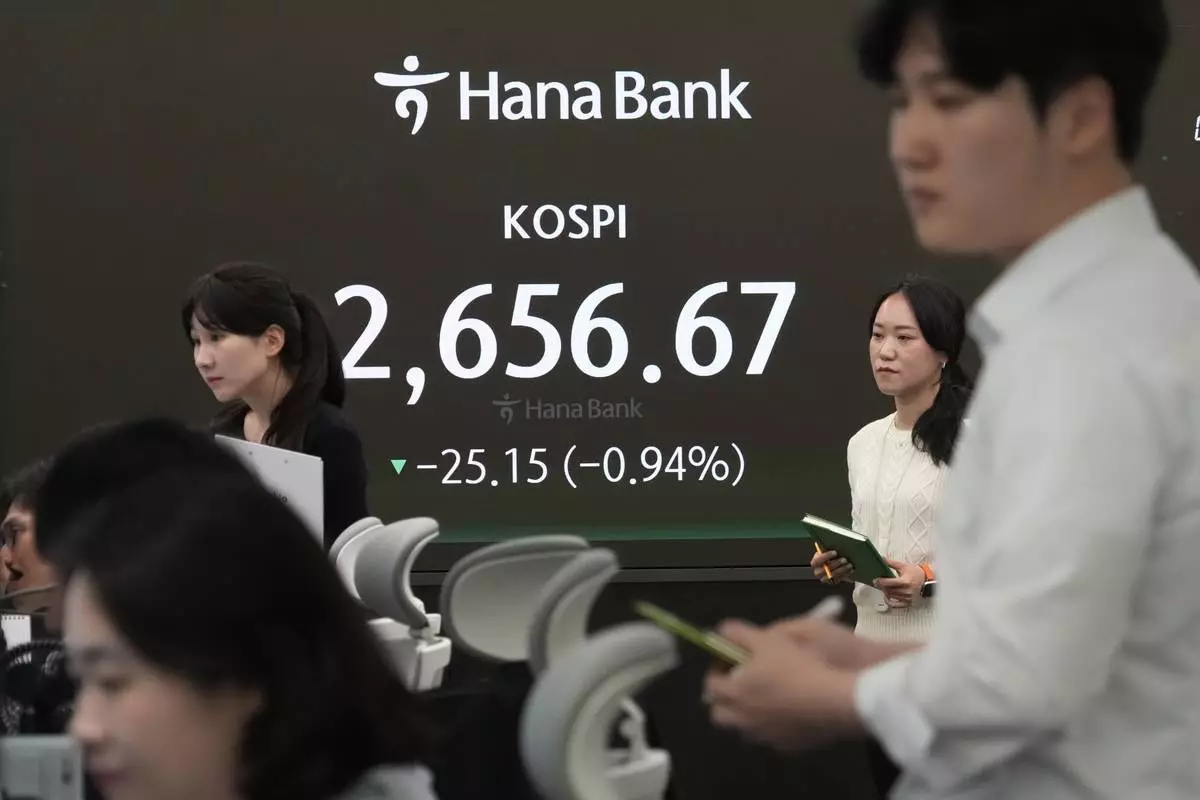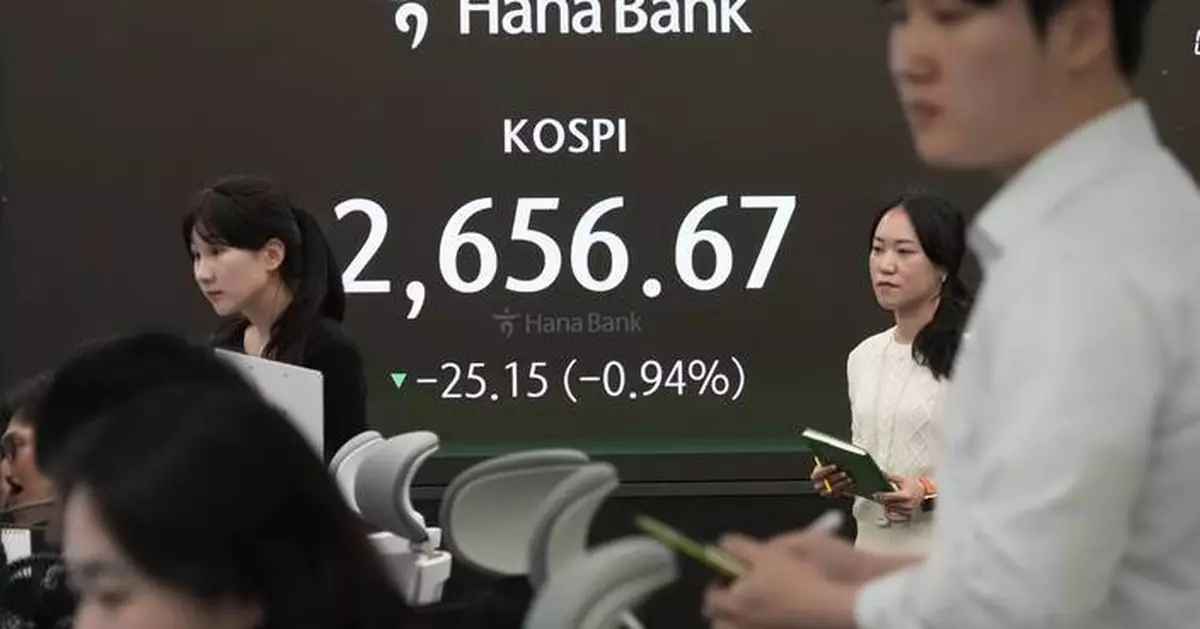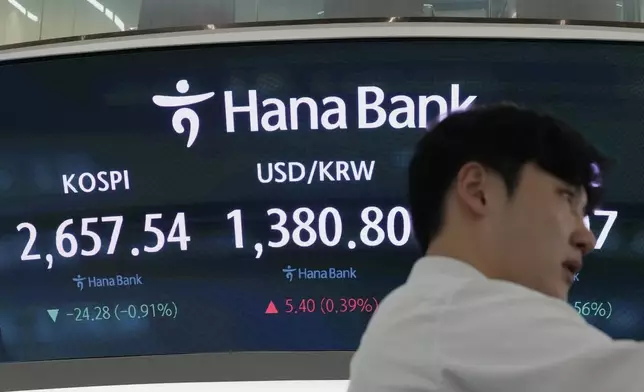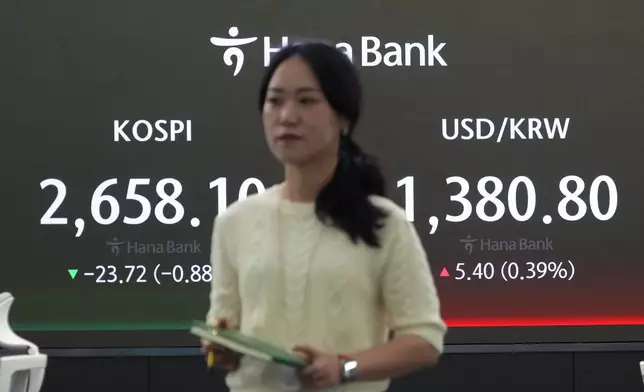BANGKOK (AP) — Asian shares skidded Tuesday following a slump on Wall Street after higher yields in the bond market cranked up pressure on stocks.
The Shanghai Composite index lost 1.4% to 3,013.84 even though the Chinese government reported that the economy grew at a faster-than-forecast annual rate of 5.3% in the first quarter of the year. In quarterly terms it expanded at a 1.6% pace.
Click to Gallery
BANGKOK (AP) — Asian shares skidded Tuesday following a slump on Wall Street after higher yields in the bond market cranked up pressure on stocks.
People pass the Fearless Girl statue outside of the New New York Stock Exchange on Friday, April 12, 2024 in New York. (AP Photo/Peter Morgan)
A currency trader works near the screen showing the Korea Composite Stock Price Index (KOSPI), left, and the foreign exchange rate between U.S. dollar and South Korean won at the foreign exchange dealing room of the KEB Hana Bank headquarters in Seoul, South Korea, Monday, April 15, 2024. (AP Photo/Ahn Young-joon)
A currency trader works near a screen reporting on Mideast tensions at the foreign exchange dealing room of the KEB Hana Bank headquarters in Seoul, South Korea, Monday, April 15, 2024. (AP Photo/Ahn Young-joon)
A currency trader passes by the screen showing the Korea Composite Stock Price Index (KOSPI), left, and the foreign exchange rate between U.S. dollar and South Korean won at the foreign exchange dealing room of the KEB Hana Bank headquarters in Seoul, South Korea, Monday, April 15, 2024. (AP Photo/Ahn Young-joon)
Currency traders work near the screen showing the Korea Composite Stock Price Index (KOSPI) at the foreign exchange dealing room of the KEB Hana Bank headquarters in Seoul, South Korea, Monday, April 15, 2024. (AP Photo/Ahn Young-joon)
The Hang Seng in Hong Kong lost 1.9% to 16,279.66.
Tokyo's Nikkei 225 fell 2.1% to 38,402.59 as the dollar continued to gain against the Japanese yen, hitting fresh 34-year highs. By midday the dollar was trading at 154.33 yen, up from 154.27 yen.
The euro slipped to $1.0613 from $1.0626.
Elsewhere in Asia, Taiwan's Taiex led the regional decline, falling 2.6%. Markets in Bangkok were closed for Songkran holidays.
In South Korea, the Kospi declined 2.3% to 2,609.13, while Australia's S&P/ASX 200 fell 2% to 7,595.30.
On Monday, the S&P 500 tumbled 1.2% to 5,061.82, following up on its 1.6% loss from last week, which was its worst since October. The Dow Jones Industrial Average dropped 0.7% to 37,735.11, and the Nasdaq composite slumped 1.8% to 15,885.02.
Stocks had been solidly higher earlier in the day, as oil prices eased with hopes that international efforts to calm escalating tensions in the Middle East may help. But Treasury yields also spurted upward following the latest report on the U.S. economy to blow past expectations.
The economy and financial markets are in an awkward phase where such strength raises hopes for growing profits at companies but also hurts prospects for easier interest rates from the Federal Reserve.
Traders want lower interest rates, which can give the overall economy a boost, and much of the U.S. stock market's run to records recently was built on expectations for cuts.
But strong reports like Monday's, which showed U.S. shoppers increased their spending at retailers last month by more than expected, have traders broadly forecasting just one or two cuts to rates this year, according to data from CME Group. That's down from expectations for six or more cuts at the start of this year. Some traders are bracing for potentially no cuts because inflation and the overall economy have remained stubbornly above forecasts this year.
High interest rates and bond yields hurt prices for all kinds of investments, particularly those that look expensive or those that compete for the same kinds of investors as bonds do.
More influential was weakness for Big Tech stocks. Apple dropped 2.2%, Nvidia fell 2.5% and Microsoft sank 2%. They've been past beneficiaries of low interest rates and often feel pressure when yields are rising. Because they're also the largest stocks on Wall Street, their movements carry extra weight on the S&P 500 and other indexes.
Microsoft, for example, swung from an early gain of 1.2% to its loss in the afternoon and was the second-largest force weighing on the S&P 500.
Helping to keep the losses in check were some financial companies that reported encouraging earnings for the start of the year. The pressure is on companies broadly to deliver fatter profits because interest rates looks so much less likely to offer support in the near term.
In the oil market, a barrel of U.S. crude for May delivery rose 48 cents to $85.89 per barrel in electronic trading on the New York Mercantile Exchange. It fell 25 cents to $85.41 on Monday as political leaders urged Israel not to retaliate after Iran’s attack on Saturday involving hundreds of drones, ballistic missiles and cruise missiles.
Brent crude, the international standard, picked up 48 cents to $90.58 per barrel. It eased 35 cents to $90.10 per barrel on Monday.
This year’s jump in oil prices has been raising worries about a knock-on effect on inflation, which has remained stubbornly high. After cooling solidly last year, inflation has consistently come in above forecasts in each month so far of 2024.
In the bond market, the yield on the 10-year Treasury rose to 4.61% from 4.52% late Friday.
AP Business Writers Matt Ott and Stan Choe contributed.

The front of the New York Stock Exchange is shown on Thursday, April 11, 2024 in New York. (AP Photo/Peter Morgan)

People pass the Fearless Girl statue outside of the New New York Stock Exchange on Friday, April 12, 2024 in New York. (AP Photo/Peter Morgan)

A currency trader works near the screen showing the Korea Composite Stock Price Index (KOSPI), left, and the foreign exchange rate between U.S. dollar and South Korean won at the foreign exchange dealing room of the KEB Hana Bank headquarters in Seoul, South Korea, Monday, April 15, 2024. (AP Photo/Ahn Young-joon)

A currency trader works near a screen reporting on Mideast tensions at the foreign exchange dealing room of the KEB Hana Bank headquarters in Seoul, South Korea, Monday, April 15, 2024. (AP Photo/Ahn Young-joon)

A currency trader passes by the screen showing the Korea Composite Stock Price Index (KOSPI), left, and the foreign exchange rate between U.S. dollar and South Korean won at the foreign exchange dealing room of the KEB Hana Bank headquarters in Seoul, South Korea, Monday, April 15, 2024. (AP Photo/Ahn Young-joon)

Currency traders work near the screen showing the Korea Composite Stock Price Index (KOSPI) at the foreign exchange dealing room of the KEB Hana Bank headquarters in Seoul, South Korea, Monday, April 15, 2024. (AP Photo/Ahn Young-joon)
CHARLESTON, W.Va. (AP) — West Virginia and North Carolina's refusal to cover certain health care for transgender people with government-sponsored insurance is discriminatory, a federal appeals court ruled Monday in a case likely headed to the U.S. Supreme Court.
The Richmond-based 4th U.S. Circuit Court of Appeals ruled 8-6 in the case involving coverage of gender-affirming care by North Carolina’s state employee health plan and the coverage of gender-affirming surgery by West Virginia Medicaid.
“The coverage exclusions facially discriminate on the basis of sex and gender identity, and are not substantially related to an important government interest,” Judge Roger Gregory, first appointed by former President Bill Clinton and re-appointed by former President George W. Bush, wrote in the majority opinion.
The ruling follows a decision earlier this month by 4th Circuit judges that West Virginia's transgender sports ban violates the rights of a teen athlete under Title IX, the federal civil rights law that prohibits sex-based discrimination in schools.
Like with the transgender sports law ruling, West Virginia Attorney General Patrick Morrisey said his office planned to appeal Monday's health care case decision.
“Decisions like this one, from a court dominated by Obama- and Biden-appointees, cannot stand: we’ll take this up to the Supreme Court and win,” Morrisey said in a statement.
After the ruling, West Virginia plaintiff Shauntae Anderson, a Black transgender woman and West Virginia Medicaid participant, called her state's refusal to cover her care “deeply dehumanizing.”
“I am so relieved that this court ruling puts us one step closer to the day when Medicaid can no longer deny transgender West Virginians access to the essential healthcare that our doctors say is necessary for us,” Anderson said in a statement.
A spokesperson for North Carolina State Treasurer Dale Folwell, whose department oversees the state's health plan, said the agency was still reviewing the decision Monday but would have a response later.
During oral arguments in September, at least two judges said it’s likely the case will eventually reach the U.S. Supreme Court. Both states appealed separate lower court rulings that found the denial of gender-affirming care to be discriminatory and unconstitutional. Two panels of three Fourth Circuit judges heard arguments in both cases last year before deciding to intertwine the two cases and see them presented before the full court.
In June 2022, a North Carolina trial court demanded the state plan pay for “medically necessary services,” including hormone therapy and some surgeries, for transgender employees and their children. The judge had ruled in favor of the employees and their dependents, who said in a 2019 lawsuit that they were denied coverage for gender-affirming care under the plan.
The North Carolina state insurance plan provides medical coverage for more than 750,000 teachers, state employees, retirees, lawmakers and their dependents. While it provides counseling for gender dysphoria and other diagnosed mental health conditions, it does not cover treatment “in connection with sex changes or modifications and related care.”
In August 2022, a federal judge ruled West Virginia’s Medicaid program must provide coverage for gender-affirming care for transgender residents.
An original lawsuit filed in 2020 also named state employee health plans. A settlement with The Health Plan of West Virginia Inc. in 2022 led to the removal of the exclusion on gender-affirming care in that company’s Public Employees Insurance Agency plans.
During September’s oral arguments, attorneys for the state of North Carolina said the state-sponsored plan is not required to cover gender-affirming hormone therapy or surgery because being transgender is not an illness. They claimed only a subset of transgender people suffer from gender dysphoria, a diagnosis of distress over gender identity that does not match a person’s assigned sex.
Before offering pharmaceutical or surgical intervention, medical guidelines call for thorough psychological assessments to confirm gender dysphoria before starting any treatment.
West Virginia attorneys said the U.S. Centers for Medicare & Medicaid Services has declined to issue a national coverage decision on gender-affirming surgery.
State lawyers said West Virginia's policy is not a case of discrimination, either, but of a state trying to best utilize limited resources. West Virginia has a $128 million deficit in Medicaid for the next year, projected to expand to $256 million in 2025.
Unlike North Carolina, the state has covered hormone therapy and other pharmaceutical treatments for transgender people since 2017.

FILE - Connor Thonen-Fleck addresses reporters while his parents stand by his side, March 11, 2019, in Durham, N.C. West Virginia and North Carolina's refusal to cover certain health care for transgender people with government-sponsored insurance is discriminatory, a federal appeals court ruled Monday, April 29, 2024 in a case likely headed to the U.S. Supreme Court. (AP Photo/ Jonathan Drew, FIle)






















